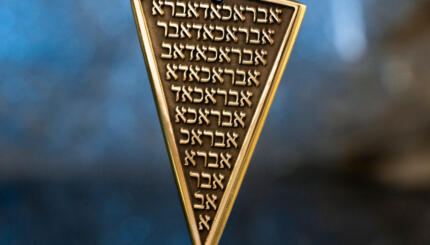“Garbage is garbage,” it’s been noted, “but the history of garbage is scholarship.” So, too, Jewish humor is funny stuff, but the history of Jewish humor provides a penetrating window into the core of the Jewish story. No doubt, one might say the same thing about Jewish language, food, literature, or music, but because humor is so sensitive to inner tensions and outer concerns, Jewish humor provides a unique entry into the Jewish psyche.
Jews have been seeing the humor in their lives for a very long time. The Bible itself recounts how Sarah laughed when told she’d have a child, and our forefather Isaac is named for that laughter. The Talmud, particularly in the aggadic (narrative) sections, is replete with witty asides and repartees, and in one famous account, the speaks of even God laughing. (Consider the theological implications of a God with sense of humor!) During the medieval period, the valuation of humor was institutionalized in Jewish communal customs, perhaps most famously in shpiels, comic plays based on the Book of Esther, which continue today in Jewish communities across the globe.
But Jewish humor as a distinctive cultural phenomenon first lights up in 19th century Eastern Europe. There, in the marketplace, the synagogue, and in the home, the Jewish joke developed into its own recognizable species. The shtetl (village) became home for the new Jewish-humor folk tradition–stories of the fools inhabiting the town of Chelm but one example. Sustaining and enriching this street humor were new Jewish texts. Jewish writers — including Mendele Mokher Seforim, Sholem Aleichem and I.L. Peretz, along with playwrights such as Abraham Goldfaden — mined the bittersweet grumbling of the Jewish ethos and produced lasting classics of Jewish humor, which in turn fed the comic banter of Jewish daily exchange.
What was the genesis of this turn to the humorous? Theorists in the next century offered a parade of hypotheses. Jewish humor, insists one standard view, is all about coping: Jews were miserable, and laughter kept them going. Jewish psychologists further deconstructed Jewish humor as introjections of this external hostility–in other words, self-mockery. Freud writes, “I do not know whether there are many other instances of a people making fun to such a degree of its own character.” Other commentators suggested the Jewish jest is a survival tactic: By altering one’s perspective, the Jew can accept the unsympathetic world for what it was. “Want to alleviate your big-time worries? Put on a tighter shoe,” advises the Yiddish proverb.

Help us keep Jewish knowledge accessible to millions of people around the world.
Your donation to My Jewish Learning fuels endless journeys of Jewish discovery. With your help, My Jewish Learning can continue to provide nonstop opportunities for learning, connection and growth.
The destruction of Eastern European Jewry in the Holocaust did not bring an end to the comic Jewish spirit, but it did change both its content and style. In pre-war European Jewry, humor was predominantly an internal affair — the Jewish joke was an inside joke. The comic lines were in Yiddish, the religious allusions were familiar to all, the fears and frustrations shared across classes, and the context of the storyline shared histories.
Then came the 20th century, where the story of American Jewish humor since World War II is largely the story the American humor since World War II. As Jews increasingly entered the American mainstream, they were not telling “insider jokes” but shaping the sense of humor of an entire country, depicting America to America.
In the early part of this Jewish humor explosion, “Yiddishisms” were essential to the repertoire, but this faded along with the European memories. The mid-20th century Borsht Belt shtick–acts that thrived in New York’s Catskills region, where Jews flocked for vacations–thrived on shared immigrant histories and traditions. But by century’s end many of these Jewish references were wearing thin. The majority of American Jews are now more comfortable eating sushi than gefilte fish. Jews are not outsiders, they generally don’t cope daily with anti-Semitism, and the average Jewish income is among the highest.
And yet, from Joey Adams to Jon Stewart, with hundreds of comedians in between, Jews continually dominated the comedy business in every area of media, from stand-up to television to literature to film. Jews cultivated the mainstream forms of cultural satire (think Lenny Bruce and Jon Stewart), self-flagellation (think Woody Allen), and audience flagellation (Jackie Mason, Don Rickles); nurtured American literary humor (Philip Roth, Jonathan Safran Foer); invented and sustained television comedy (Milton Berle, Roseanne Barr, Larry David); dominated stand-up comedy (Rodney Dangerfield, Jerry Seinfeld), and on and on.
Some wonder whether Jewish humor will continue to flourish in the years ahead: Will the Jewish funny bone calcify with assimilation? Will the old Jewish comic themes–biting social commentary discomfiting satire, the undermining of the high and mighty, arguments with everyone, including God, the sheer cleverness–continue to drive the Jewish jest?
The traditional answer to all these questions is, “Who knows?” Better we should go directly to the business at hand: Two Jews walk into a shul…. ah, but you heard that one already, no?



